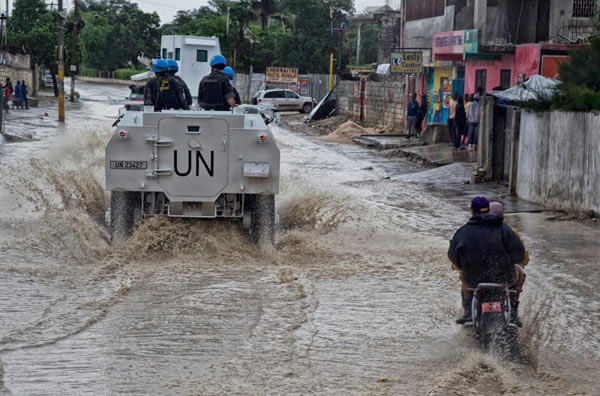Last month the United Nations (UN) officially ended their Haiti stabilization mission MINUSTAH after more than a decade, and officially launched a new and smaller operation — the United Nations Mission for Justice Support in Haiti (MINUJUSTH) that effectively started on Oct. 16.
Earlier this year, the UN Security Council announced that the 13-year-old mission was ending, and was being replaced with the small-scale force. That new quest will keep peacekeepers in Haiti for another six months until April 15, 2018, which is expected to reduce their soldiers over the net two years. As a result the United Nations has achieved several goals in improving Haiti, said a UN chief communications officer.
“Since the establishment of MINUSTAH in 2004, Haiti and the Mission registered the accomplishment of several successes, particularly in the stabilization of the security environment, democracy, and the strengthening of Haitian institutions, especially the Haitian National Police,” said Sophie Boutaud de la Combe.
With the presence of peacekeepers in the country, the United Nations has been able to assist Haiti during a series of natural disasters such as the 2010 earthquake and hurricane Matthew in 2016, according to Boutaud de la Combe. And the result of that is a strong relationship between the global organization and the country.
“Even after MINUSTAH departs, the United Nations’ partnership with the government of Haiti and its people for the betterment of the country as a whole will continue through the MINUJUSTH and the 19 United Nations agencies, funds, and programs present in the country,” she added.
But the United Nations’ presence in Haiti has been mired in controversy with mounting allegations against several peacekeepers, who stand accused of gross misconduct that include sexual abuse, bribery, and bringing the first ever case of cholera to the island. Under the current mission, officials say addressing this issue is their main focus.
“Addressing sexual exploitation and abuse by United Nations personnel is a top priority for the new Mission (MINUJUSTH) — we have a particular duty of care towards the people we serve,” she said. “Every allegation we receive is a stark reminder that we must redouble our efforts made to eliminate this scourge.”
To address this, the United Nations has now instituted a three-pronged strategy aimed at eliminating all sexual abuse crimes and enforcing their zero tolerance policy, added Boutaud de la Combe.
Last year, the UN’s then Secretary General Ban Ki-moon apologized to the Haitian people for their lack of effort to prevent the spread of cholera. Today, small strides have been made but their multi-million dollar budget to fight it still needs funding to eradicate it.
“The downward trend achieved in late 2016 and early 2017 is an opportunity to take a big step towards the elimination in 2017, but only if funding is available and the response is intensified,” said Boutaud de la Combe. “The new United Nations approach will continue supporting the national authorities aimed at reinforcing the resilience of the population with a collective support, since it is through collective effort that cholera can be defeated.”
And even with mixed reactions from Haitians in Haiti and abroad about the United Nations, representatives are confident that there is a sense of safety most Haitians have in regards to peacekeepers.
“In the various interactions I had with Haitians, they expressed how much they welcome the continuous commitment of the United Nations to supporting the stabilization and development priorities of the Haitian people,” said Boutaud de la Combe. “When they first understood MINUSTAH was leaving, they were concerned because they thought the United Nations was leaving. We reassured them that it is not the case.”


























